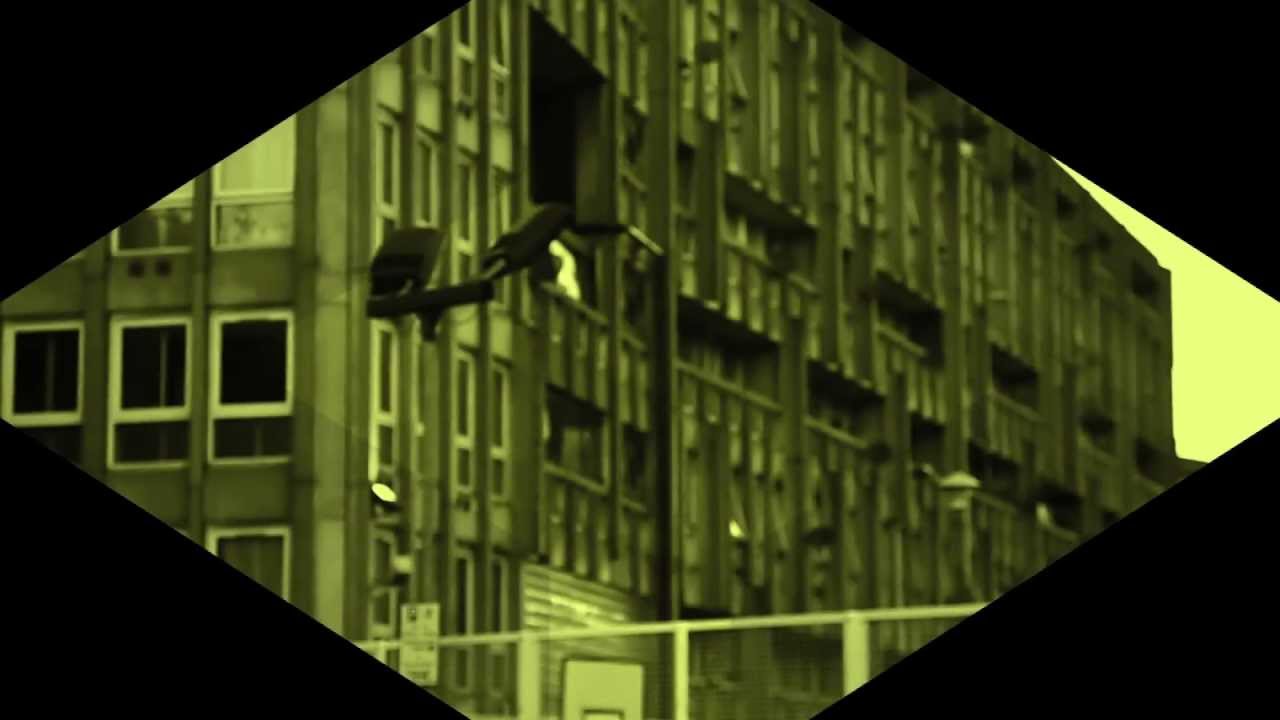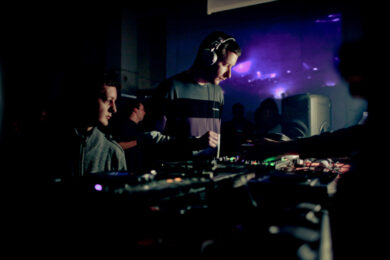Dusk, aka Dan Frampton, and Blackdown, aka Martin Clark, inhabit multiple roles within the realm of pirate radio-rooted UK dance music. On the one hand, there’s more than a hint of the curator to their approach. Clark has spent the past few years running the Blackdown blog which has tracked mutations in grime, dubstep and funky, and until recently wrote Pitchfork’s ‘The Month In Grime & Dubstep’ column, which was responsible for drawing a great many listeners’ attention to those genres in their earlier days. Equally, the duo run a label – Keysound Recordings – and host a monthly show on Rinse FM that draws together and forms links between interrelated sounds. As a result of the great changes that have taken place in London dance music over the past few years – dubstep and grime to funky, ‘bass music’, drum machine tracks and all manner of in-between hybrid forms – both label and radio show have been in a constant state of evolution.
The music they produce feels, in the main, like a further extension of these activities. It’s certainly another expression of that same love for dark, sub-bass driven, syncopated UK electronic music. Meeting up in a dingy North London pub to discuss their second album Dasaflex, which was released in September, both Clark and Frampton speak about the opportunities that come from working within established lineages and finding their own distinctive take on them. Indeed, that’s exactly what makes Dasaflex work so well. Where 2008 debut album Margins Music took on dubstep and grime, and found the duo exploring the nexus points at which the two genres bled into one another, its follow-up also assimilates funky, the re-emergence of garage beats and the radioactive synth work that’s become characteristic of labels like Hyperdub and Night Slugs.
That full range of influences are processed, explored and melded together across the course of Dasaflex‘s length, expressed in tracks that touch on Wiley-style eski beats (eerily placid opener ‘Android Heartbreak’), MC culture (‘Apoptosis’, ‘Wicked Vibez), two-step (‘Hypergrime’ and ‘Fraction’). They’re bound together by a melodic sensibility unique to the duo that recalls, but never quite apes, the Oriental melodies of early sino-grime, the overdriven scream of Terror Danjah and Joker, and the nuclear whirr of Kode9’s ‘Black Sun’.
It’s been a few years between the first record and Dasaflex. Did it take that whole amount of time to put together?
Martin Clark: It took about the same amount of time as the first one I think.
How long was that?
MC: Four years.
I don’t remember hearing that many new tracks of yours in that time period. Except one Rinse FM session when you ended up playing a load of new ones.
MC: We have to be a bit careful – I don’t know if we’ll ever be prolific producers. We’re quite detailed in our making of music. We tend to work on things intensively rather than making loads of tunes and the best ones rising to the top. I don’t know if we’ll ever have loads of tunes to play all the time. And that’s fine.
So did the tracks just naturally came together over that period of time?
Dan Frampton: Yeah, I think so. Regularly going into the studio, just doing what we did, being influenced by what we were listening to on the radio and playing ourselves on the radio as well – that double feedback thing.
From my perspective, I wasn’t locked into pirate radio music for the entire four year period before you released Margins Music, but I have been for the entire time since, so I’ve been acutely aware of the huge changes that have happened in the time. Were there similarly dramatic shifts going on in pirate radio music in the four years preceding Margins Music?
MC & DF [together]: No.
DF: Grime and dubstep were becoming separated just about by that time. By the time we started doing our show [on Rinse FM, in 2008], there would be a few funny faces when we were playing grime, a few guys going ‘These grime guys, some of them are a bit naughty, going to prison and stuff’… That was when it started becoming apparent – around the time we released [Margins Music] – that there were people getting into dubstep who weren’t aware at all of grime. Whereas before… you mentioned Plastician earlier – he used to describe his music as instrumental grime, and that was interchangeable with dubstep… Kind of.
MC: Croydon techno.
DF: [laughs]
MC: He made a very noir, twisted form of the space between techno and dubstep, that industrial sound, ‘Char’, and all those tracks, he really pioneered that. The same with Mark One, but really I think mostly Plastician had his own sound for his stuff. I wrote a track called ‘C-troit’ that was inspired by that stuff, that never came out. So some of these ideas are quite cyclical.
But I think you can think of [our music] up to Margins Music as really being [about] imagining the possibilities within two scenes, pushing the boundaries from within dense communities. Whereas afterwards, as you’re probably aware, there was this mass destruction, proliferation, diverse, weird field of different possibilities. That’s what the second album is much more about: navigating those possibilities and saying, if you’re going to take one of those possibilities, how would it sound for me and Dan, or how would we do that our way? Or, what is this direction or that direction, and is there anything in it that means anything to us and relates to us and our identity? Or actually, are we completely against that one, we can’t possibly do this one? It’s all those kinds of questions that we were trying to work through.
When I listen to the new record I can hear aspects of a lot of what’s been going on over the last few years – changes in genre, the internet – all these ideas that interweave. That’s the basis for quite a lot of things I’m interested in asking you guys about for this record, because it’s been quite an interesting period of time. With the internet becoming a more influential thing over the time period since 2005-2006, there’s been all these associated knock on effects, proliferation, atomisation of geographically-centred scenes…
DB: It’s strange, I don’t know if it will ever really happen again. Is there going to be another shift that big in the next 5 years?
That’s one of the questions I was going to ask you!
DB: I don’t know! Predicting the arc of the future is a foolhardy game, but I think it would be unlikely to see the change between 2002 and 2012. It’d be exciting if it happens again.
DF: At the same time, I do think this is something you can overplay a little bit. Certainly with dubstep, and to a lesser extent with grime. To me, [with] grime, radio played a massive, massive role in it, in a way I’ve not seen the internet do, for that artform of battling. Are you going to get anything like those YouTube videos of Dizzee and guys turning up in Rinse studios? Is that going to work over 3000 miles on a Skype link? Maybe not. But also with dubstep – just the bass, this big set-up, lots of subs. You can have all the interaction in the world and all the links between people on Twitter, but ultimately you need that physical set-up, a space to listen to it, and enough people to get it off the ground, because computer speakers really aren’t going to cut it.
A lot of what you guys seem to do feels based around those kinds of physical localities: there’s a London aspect to it, a pirate radio aspect, a club thing, all of these elements, and even Margins Music and its ideas of divides between communities. Has that been a major preoccupation of yours throughout?
DB: It has, but I do think… Because of connectivity now, you can have clusters of people with shared interests and that pirate vibe, and they don’t actually have to be [in the same place]. If you were in the grime scene in 2002, you had to go into East London to find them predominantly, guys sat on walls talking to Wiley in Mile End – that’s how you found Wiley, he was on a wall in Mile End! [laughs] – but now if we find people that share an interest in grimey eski stuff, it’s Walton in Manchester or Gremino in Finland, and we can share common cause with them. Does that mean there’s a total loss of identity because of the internet? I don’t think there is. It sort of opens connections as much as it dissolves them.
I think the question that Dan raises is probably more powerful – the effect of laptop speakers and headphone speakers. I’m not a hi-fi dullard, I don’t want to moan about a lack of wav quality everything, it just is the way things are. But I mean, it is a basic fact – with the sonics of these things – that you can’t hear a Mala record or a proper dubstep record if you listen to it on YouTube via headphones or laptop speakers.
DF: But I suppose you can listen to something that goes "WEEEAAAAH-wob-wob-wob-wob".
In terms of the other stuff that’s been changing in the time period between Margins Music and Dasaflex, there have been huge changes in sound and genre, and especially the rise of funky. That has a look in into your new record in a way that doesn’t necessarily feel direct…
MC: Oh, it’s overt. Or it’s overt for me.
To me it doesn’t necessarily sound like you were saying ‘Let’s just make a funky track’.
MC: That’s nice. I think for me personally funky’s had more influence than any one of the other genres. Funky’s the single biggest influence, and you can see it in the album: a lot of it’s at 130 [bpm] – ‘We Ain’t Beggin’, ‘Next Generation’, ‘Dasaflex’, and ‘Wicked Vibez’ are all somehow related to that stuff. But I think with all of these things, we like being part of scenes and we like exchanging ideas. We think it’s a strength, not a weakness. Rather than saying, ‘We’re going to hide away and isolate ourselves from the community and be awkward’. The scenius/genius thing, right? I believe strongly in the scenius thing, it’s a really strong idea. [NB. ‘Scenius’ is a term coined by Brian Eno to articulate the notion that the interactions between individuals within a scene drive creativity, and that the work of multiple minds leads to greater innovation]. But equally there’s a relationship between stealing ideas and cloning, and having your own take. So when something like UK funky comes along, we say to ourselves, ‘How can we do this our way?’ What values, sounds, ideas…
DF: We’re not going to add anything if we just come up with Funkystepz mark II. We love what they’re doing, but we’re never going to do their style better than them, and it would look a bit bait really.
MC: So then you go through the process of, ‘This is an interesting idea, how can we twist it this way, or that way?’
DF: The elements there we can grab.
MC: Mutation. I think if you start to bring in enough different ideas from different places, start overlaying them, and see how they play out in different scenarios, then you’ll ultimately end up with something that’s greater than the sum of its parts. Hopefully. It’s hard for me to judge but that’s what we try and do. ‘Apoptosis’ on the album is kind of 8-bar, it’s kind of UK funky, and it’s got these 808 sounds in it – but is it a drop tune or is it a groove tune? Which is louder? The drop is the kickdrum. Those are the tensions we get in these things. So, ok, we come from bass drop culture, but funky is groove culture, so how do you do a grimey funky record? Those are the things that end up playing out that I find really interesting.
I remember your radio shows when funky was starting to turn up – you started playing a lot of it. Did it just instantly click with you?
DF: Some bits did, other bits didn’t. The bits that didn’t, for me anyway, reminded me of the bits of UK garage that didn’t do it for me. But I could see that actually from [those] would come something else, guaranteed. You could just hear it evolving, naturally, again. Maybe – probably – the last kind of thing you’ll hear like that on FM radio.
MC: At first it was very familiar, in regards that I really like percussion, and [older] things like Agent X’s ‘Decoy’, or ‘Classic Deluxe’ by Horsepower have that soca beat, so we were quite attuned to that pattern on this kind of stuff. We were always making that kind of stuff anyway – [funky] was just slower than what we were doing. [To Dan] Like you said, some of the vocally stuff I could take or leave. I’ve got a slight taste for some vocals maybe more than Dan, but broadly we’re not so crazy about full on vocals.
There was only a few I really loved. Crazy Cousinz…
MC: Kyla, ‘Do You Mind’, was the one that really worked for me. I think the vocal has a really key part in all garage and in funky, it’s just a personal preference how it plays out. Ghost – El-B – was the producer that made me want to write music, and he was great at using female vocals, snippets, like ‘Serious’ – just these little snippets of vocals over a huge bassline, to soften it, or edge it…
DF: Or sometimes make it harder! The ‘Celebrate Life’ [remix of Brasstooth], I don’t know what the original sounds like – I bet that was a bit of a belter – but his version of it is really quite tough, and it doesn’t sound like a hands in the air in Romford thing.
Or his Brandy refixes. Taking something that’s so saccharine and sweet and making it sound so freaked out.
DF: For me, that’s a lot of what this record is about. Especially in the earlier section. These balances, where you’re trying to balance a bit of sugariness with a bit of spice, sharpness, or nastiness.
MC: We seek out those balances. You can call them balances or you can call them contradictions – they’re both – so we seek out those disharmonies and harmonies, and sometimes the most off-key stuff can be so pleasurable. I learnt that from Kode9 so much, with things like ‘Black Sun’, these weird puzzles of tracks. Some of the most dischordant stuff… The genius of those things is that they’re painful in a pleasurable way or pleasurable in a painful way. If you swing that balance too far you get to brostep, where you just overemphasise something in a really ridiculous way.
DF: Or [you’re] just deliberately obtuse. Or tepid. And again, it’s not like a one dimensional thing, there are lots of ways to end up in the wrong place!
MC: But those tensions keep it in the groove, and inherently dance music is about tensions. You do have a box, you’re trying to achieve something – it’s a bit dumb to write in 3/4, it’s a bit dumb to write at 300bpm or at 2bpm. … [But] I celebrate anyone who finds those tweaks. If you talk about the parameters in these things, it’s very easy to throw them away, and say ‘I’m going to make 2bpm abstract crazy shit’, and it just has no structure or anything. Personally, while I respect it, I don’t find that stuff very pleasurable or very exciting. Whereas when someone takes a normal set of constrictions and finds a unique twist – when you thought there were none left – it’s brilliant.





